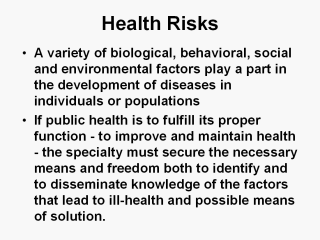| front |1 |2 |3 |4 |5 |6 |7 |8 |9 |10 |11 |12 |13 |14 |15 |16 |17 |18 |19 |20 |21 |22 |23 |24 |25 |26 |27 |review |
 |
The importance of
infectious and toxic hazards in the causation of disease is universally
accepted. But not all individuals exposed to a particular hazard succumb.
There are a variety of biological, behavioral, social and environmental
factors which play a part in the development of diseases in individuals or
populations. In chronic diseases such as cancer of the lung, coronary heart
disease, diabetes, or stroke, multiple factors are involved in the
development of illness. And although we accept that certain forms of treatment should be given for particular conditions and certain outcomes expected, there are wide variations within both these parameters. The main determinants of ill-health are associated with social factors such as unemployment and deprivation, risk-taking behaviors such as cigarette smoking and over-consumption of alcohol, environmental factors such as housing and fluoride in the water supply, genetic predisposition and the availability and quality of clinical services. The role of public health in finding a way through the jungle of determinants of disease is an extremely complex one. Many of these factors are related inextricably to political, professional and economic realities. Their identification may well antagonize one interest group or other. Public health physicians therefore, require diplomatic, political and persuasive skills to achieve the most positive results. These qualities are in short supply in any field of endeavor and, although public health tries to fulfill its role, it has not always been successful either in describing dangers to health clearly and forcibly enough or in proposing workable and acceptable solutions. This has become no easier in the past few years when little meaningful attention has been paid to the indisputable relationship between deprivation and ill-health. If public health is to fulfill its proper function - to improve and maintain health - the specialty must secure the necessary means and freedom both to identify and to disseminate knowledge of the factors that lead to ill-health and possible means of solution. This may on occasion involve pointing the finger at particular groups - for example, tobacco manufacturers, farmers, butchers, even clinicians - and it is obviously of the utmost importance that such knowledge is based on incontrovertible evidence and is presented responsibly - and where possible without the hysterical media reportage that has been all too common in recent times. Put plainly, public health must regain an independent voice and use it. Health Authorities have a responsibility to do everything in their power to prevent ill- health and to provide clinical services to those who need them. But many of the factors which cause ill-health are under the control of other Local Authority departments or central government and the opportunity for public health to intervene may be limited. Some important public health messages are uncomfortable and unpopular politically and others may have unwelcome resource implications. |